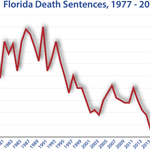
State & Federal
Florida

History of the Death Penalty
Prior to 1923, executions in Florida were carried out by the county, rather than the state. Florida changed execution methods from hanging to electrocution, when it placed executions under state control.
Timeline
1827 – First known execution in Florida, Benjamin Donica hung for murder.
1923 – A bill places all executions in Florida under state (rather than local) jurisdiction, and substitutes hanging for the electric chair.
1972 – The Supreme Court strikes down the death penalty in Furman v. Georgia. Florida subsequently passes a new capital punishment statute.
1976 – The Supreme Court reinstates the death penalty when it upholds Georgia’s statute in Gregg v. Georgia. In Proffitt v. Florida, the Court also upholds the Florida statute.
1979 – Florida is the first state to carry out a non-voluntary execution post-Gregg when it executes John Spenkelink.
1990s – Florida botches the electric chair executions of Jesse Tafero, Pedro Medina, and Allen Lee Davis and subsequently begins using lethal injection as its execution method.
2002 – Aileen Wuornos, called the first female serial killer by the media, is executed.
2016 – Florida statutorily abolishes judicial override, the process by which trial judges were permitted to impose death sentences despite an advisory jury’s recommendation for life.
2017 – Florida statutorily abolishes non-unanimous jury recommendations for death and requires that the sentencing jury unanimously recommend a death sentence before the trial judge may impose a death sentence.
2020 — The Florida Supreme Court reverse a long-held precedent requiring capital appeals to be reviewed for proportionality. The court announced that it will no longer conduct proportionality reviews which are intended to guard against the imposition of the death penalty in cases that do not warrant it.
2022 — A non-unanimous Florida jury returns a verdict of life without parole for NIkolas Cruz, a teen offender convicted of killing 17 people in the shooting at Marjory Stoneman Douglas High School in Parkland, Florida.
2022 — Two secrecy bills unanimously pass Florida’s criminal justice committees in the House and Senate. These bills exempt the Florida Department of Corrections from having to disclose to the public the companies that provide lethal injection drugs or the people who administer the drugs during the execution.
2023 — Governor Ron DeSantis signs a bill ending the requirement for juries to vote unanimously to recommend capital punishment in a capital felony case in order for a judge to sentence a defendant to death. An 8‑juror majority is now needed for a death sentence to be imposed.
2023 — Governor Ron DeSantis sign legislation allowing the death penalty to be sought in sexual battery cases against a minor under the age of 12.
Famous Cases
Aileen Wuornos was executed on October 9, 2002 for the murder of Richard Mallory, but she had also received death sentences for 5 other murders, and confessed to a seventh murder, though she wasn’t tried for it. Her case garnered extensive media attention, and she was labeled America’s first female serial killer. Wuornos suffered from severe mental illness, but the state of Florida found her competent to waive her remaining appeals and be executed. Wuornos’ case was the inspiration for the Oscar-winning film “Monster.”
Notable Exonerations
Florida has had 30 exonerations from death row, more than any other state. You can read about all of Florida’s exonerations on DPIC’s Innocence page.
The first exoneration in the United States after Furman v. Georgia was David Keaton. On the basis of mistaken identification and coerced confessions, Keaton was sentenced to death for murdering an off duty deputy sheriff during a robbery. The State Supreme Court reversed the conviction and granted Keaton a new trial because of newly discovered evidence. Charges were dropped and he was released after the actual killer was identified and convicted.
Delbert Tibbs, a former Theology student, was convicted in 1974 for a murder of Terry Milloy and the rape of Milloy’s traveling companion, Cynthia Nadeau. Nadeau picked Tibbs out of a lineup and testified against him, even though he did not match her original description of the perpetrator. The Florida Supreme Court ordered a retrial, saying that the victim was an unreliable witness. Prosecutors dropped the charges against Tibbs and he was released in 1982.
Joseph Green Brown was sentenced to death in 1974 for the murder of Earlene Treva Barksdale. The case hinged on the testimony of Ronald Floyd, who later admitted he had lied. Jurors never heard testimony from an FBI ballistics expert who said a gun linked to Brown could not have fired the bullet that killed Barksdale. In 1983, Brown came within 15 hours of execution before a Florida judge issued a stay, but waited two and a half more years before his conviction was overturned, and an additional year before charges were dropped.
In 1982, Juan Ramos was convicted of the murder of an acquaintance. No physical evidence linked Ramos to the crime, but later-discredited evidence from a scent-tracking dog convinced the jury to convict him. A judge overruled the jury’s recommendation for a life sentence and sentenced Ramos to death. In 1985, the television news show 20/20 exposed the unreliability of scent-tracking evidence. The following year, the Florida Supreme Court overturned Ramos’ conviction, saying that canine scent-tracking was completely untested. At a retrial in 1987, Ramos was acquitted.
Frank Lee Smith spent 15 years on death row before he died of cancer in 2000. Just months after Smith’s death, DNA testing cleared him of the crime for which he had been convicted in 1985. The sole witness in the case had recanted her testimony in 1989, identifying Eddie Lee Mosely, who was later implicated by DNA testing.
On October 12, 2015, the Florida Department of Corrections released Derral Hodgkins from custody after the Florida Supreme Court acquitted Hodges of all charges in the stabbing death of his former girlfriend. The trial judge had imposed a death sentence for the conviction following a 7 – 5 vote by the jury to recommend death. No eyewitnesses placed Hodgkins in the vicinity at or around the time of the murder and the evidence against him was completely circumstantial.
With newly discovered confessions and DNA evidence pointing to the prosecution’s chief witness as the actual killer, Seminole County, Florida prosecutors dropped all charges against Honduran national Clemente Javier Aguirre in 2018. Aguirre was convicted and sentenced to death in 2006 for the murder of two neighbors. He steadfastly maintained his innocence, saying he had discovered the women after they had been killed. He did not report the murders to authorities, he said, because he was an undocumented immigrant and feared deportation. On October 27, 2016, the Florida Supreme Court unanimously vacated Aguirre’s conviction and granted him a new trial.
Clifford Williams, Jr. was exonerated in 2019, forty-two years after he and his nephew were wrongfully convicted of murder and he was sentenced to death. Submitting a report from its Conviction Integrity Unit that found “no credible evidence of guilt and … credible evidence of innocence,” Duval County prosecutors asked a Jacksonville trial court to dismiss all charges against Williams, 76 years old, and his nephew, Nathan Myers, 61.
Notable Commutations/Clemencies
Governor Bob Graham granted six clemencies during his term as governor. No other Florida governor since 1976 has granted clemency to a death row inmate. Learie Leo Alford and Jesse Rutledge received clemency from Graham due to their possible innocence.
Milestones in Abolition/Reinstatement
Florida was the first state to reintroduce the death penalty after Furman v. Georgia struck down all existing death penalty laws.
Other Interesting Facts
The U.S. Supreme Court has ruled Florida’s death penalty practices unconstitutional numerous times, including:
- In Enmund v. Florida, in 1982, the Court ruled that Florida violated the Eighth Amendment when it attempted to apply the death penalty to defendants who were minor participants in a crime that resulted in a murder, but who did not themselves kill, attempt to kill, or intend to kill the victim.
- In Hitchcock v. Dugger, in 1987, the Court — in a unanimous opinion written by Justice Antonin Scalia — ruled Florida’s death penalty statute unconstitutional because it did not allow the advisory jury or the sentencing judge to consider reasons the defendant offered to spare his life unless those reasons were listed among the mitigating factors that the legislature had set out in the state’s death penalty statute.
- In Hall v. Florida, in 2014, the Court ruled that Florida had unconstitutionally impaired the enforcement of the Eighth Amendment prohibition against subjecting persons with intellectual disability to the death penalty by applying a hard IQ-cutoff score of 70 to deny death-row prisoners’ intellectual disability claims.
- In Hurst v. Florida, in 2016, the Court ruled that Florida’s sentencing statute violated the Sixth Amendment right to a jury trial because it required that a judge, rather than a jury, make findings of fact as to whether the prosecution had proven that a defendant is eligible to face the death penalty.
Until 2016, Florida was one of three states that permitted trial judges to impose the death penalty based upon a jury’s non-unanimous recommendation for death. In Hurst v. State, the Florida Supreme Court ruled that the practice violated the state’s constitution, and the Florida legislature, in March 2017, adopted a new sentencing law requiring a unanimous jury recommendation for death before the judge could impose a death sentence.
Florida allows inmates to choose whether they will be executed by electrocution or lethal injection.
The youngest inmates executed in Florida were both 16 years old. Willie Clay was executed on December 29, 1941 and James Davis was executed on October 9, 1944.

Resources

Florida Execution Totals Since 1976
News & Developments
News
Oct 08, 2025
Upcoming Executions Illustrate Persistent Themes and Concerns Around the Death Penalty
October 9, 2025 UPDATE: On October 9, 2025, just a week before his scheduled execution, the Texas Court of Criminal Appeals (CCA) granted Robert Roberson a stay of execution and remanded his case to the district court for further consideration of his request for relief based upon relief offered in a similar case, Ex parte Roark. Like Mr. Roberson’s case, Ex parte Roark**, also involved a conviction based the now…
Read MoreNews
Sep 29, 2025
Counsel Seeks to Challenge Rare Execution of 72-Year-Old Florida Prisoner on Constitutional Grounds in Florida Supreme Court
With just weeks remaining before his scheduled execution, attorneys for 72-year-old Samuel Lee Smithers are appealing the dismissal of their motion filed September 19, 2025, arguing that executing an elderly person violates both Florida and the U.S. Constitutions’ prohibition against cruel and unusual punishment and fails to meet any valid penological justification. On September 22, 2025, the Hillsborough County Circuit Court denied Mr. Smithers’ request for an…
Read MoreNews
Sep 16, 2025
Two Scheduled Executions of People with Intellectual Disability in Florida Raise Serious Concerns
The U.S. Supreme Court’s 2002 decision in Atkins v. Virginia established that the Eighth Amendment prohibits executing people with intellectual disability. The Court later clarified that rigid IQ cutoffs were not permissible and also required states to consider meaningful evidence of intellectual disability, including scientifically valid expert testimony and adaptive functioning deficits. Despite this unequivocal constitutional protection,…
Read MoreNews
Sep 08, 2025
DPI Analysis: Death Warrants Under a Spotlight
40 active death warrants have been issued in the United States thus far in 2025 — more than a third of them were issued by one individual, Florida Governor Ron DeSantis, in a process cloaked in secrecy. The only two states that place authority solely in the hands of the governor to issue an execution warrant are Florida, which has executed more individuals in 2025 than any other state, and Pennsylvania, which has not executed anyone in over 25 years and where a…
Read MoreNews
Aug 20, 2025
Former Alabama Governor Urges Use of Clemency, Criticizes Florida’s Execution Process as “Shrouded in Secrecy”
In an August 14, 2025, op-ed in the South Florida Sun Sentinel, former Alabama Governor Don Siegelman revealed he has“lived to regret” not commuting death sentences while he was in office, and criticized Florida’s execution selection process, citing serious concerns with secrecy and racial bias. Writing about two scheduled executions in Florida — Kayle Bates on August 19 and Curtis Windom on August 28 — Gov. Siegelman argues the cases surface systemic problems in…
Read More